

Disarm Your Audience When You Present - Nancy Duarte. By Nancy Duarte | 8:00 AM November 12, 2012 When you walk into a room as a presenter, it’s easy to feel as if you’re the central figure: You’re up front, and people came to hear you.

In reality, though, you’re not the star of the show. The audience is. Structure Your Presentation Like a Story - Nancy Duarte. By Nancy Duarte | 8:00 AM October 31, 2012 After studying hundreds of speeches, I’ve found that the most effective presenters use the same techniques as great storytellers: By reminding people of the status quo and then revealing the path to a better way, they set up a conflict that needs to be resolved.

That tension helps them persuade the audience to adopt a new mindset or behave differently — to move from what is to what could be. 10 steps you can take right now to improve your presentations « Public Words. Improving your presentation skills can be hard work. Changing behavior takes time. But there are some easy things you can do right now that will make a concrete difference in your presentation success rate. The role of emotion in public speaking « Public Words. Emotion – is it a good thing or a bad thing? For many years, people struggled to keep it out of business, thinking that to be emotional showed weakness, or indecision, or lack of judgment, or something equally damning. Today, attitudes have shifted, and we now recognize the importance of emotion in motivation, in communications, and in leadership.
Indeed, we’ve learned from brain research that without emotion there is no memory. Improve Your Public Speaking with a More Effective Mindset - Peter Bubriski. By Peter Bubriski | 8:35 AM February 24, 2011 [For more, visit the Communication Insight Center.]
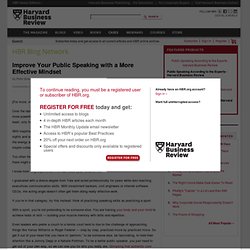
Improve Your Public Speaking by Being Yourself - Management Tip of the Day - April 28, 2011. The Benefits of Speaking Aloud - Jerry Weissman. By Jerry Weissman | 11:17 AM October 5, 2011 Writers have long known that speaking aloud what they have written in silence helps them to shape their ideas.

In a Wired article on voice recognition, Clive Thompson tells of 16th-century French essayist Michel de Montaigne and 19th century American writer Henry James, both of whom wrote by dictating their work to their secretaries. Moving to the present, Thompson cites the example of writer and critic Tim Carmody, who “found himself staring at an empty page, not knowing where to begin. He had no problem talking to friends about his ideas, so Carmody booted up Dragon (voice recognition software from Nuance) talked aloud for hours, and got past the block.” Carmody was experiencing the front end of a spectrum of benefits that comes from combining the written words with the spoken. Giving sound to what had been a silent process puts writers in the role of their readers.
Power Presentations - The Art and Science of Powerful Presentations. What to Do With Your Hands When Speaking - Jerry Weissman. By Jerry Weissman | 9:42 AM January 11, 2012 The most frequently asked question of presentation coaches is “What do I do with my hands?”

Authentic Presentations Take Practice - Nancy Duarte. By Nancy Duarte | 12:00 PM November 28, 2012 Lots of us fall into the “smart” trap when presenting: we work so hard to be polished and articulate that we overcompensate and come across as flat, boring, and egg-headed.

We’ve all certainly heard (and suffered through) talks like this. So how is it that great communicators manage to engage and entertain their audiences while sounding smart? Create a Presentation Your Audience Will Care About - Nancy Duarte. By Nancy Duarte | 9:00 AM October 10, 2012 Generating ideas is the easiest part of creating a presentation.
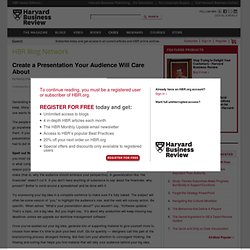
The hard part is deciding what to keep. Many of your ideas may be fascinating or clever, but you can’t squeeze them all in — and no one wants to hear them all, anyway. The people in the audience are the stars of your show. If they don’t buy what you’re saying, it won’t go anywhere. Spell out the big idea: Your primary filter should be what I call your big idea: the one key message you must communicate.
Try expressing your big idea in a complete sentence to make sure it’s fully baked. Five Presentation Mistakes Everyone Makes - Nancy Duarte. By Nancy Duarte | 2:00 PM December 12, 2012 We all know what it’s like to sit through a bad presentation.
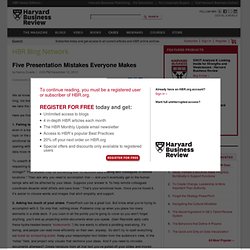
We can easily spot the flaws — too long, too boring, indecipherable, what have you — when we watch others speak. The thing is, when we take the stage ourselves, many of us fall into the same traps. Here are five of the most common, along with some tips on how to avoid them. 1. To unearth the emotional appeal of your ideas, ask yourself a series of “why” questions. Public Words.
Presentation Zen. Last week, a mere two days after he wrote an article entitled "A Leave of Presence," the acclaimed and beloved American film critic Roger Ebert died. Like millions of other people, news of his passing deeply saddened me. I loved Ebert's writing, his wit, and his determination battling illness these past years, but I will always remember him from the '80s with Siskel & Ebert. Their authenticity was so rare and appealing back then (it's still rare today). I learned a lot about what makes for a good film over the years by reading or listening to Roger Ebert.
Since the '90s, Ebert took time to write about many, many good films from the past. Book marketing plans for authors - Roger C. Parker - sample author websites - daily writing tips - book writing resources - free writing teleseminars, book coaching. Signal vs. Noise by 37signals — Business, Design, Programming and the Web. 10 great books to help you think, create, & communicate better in 2012. In the spirit of personal kaizen, I have listed below a few books that I read (or reread) over the past year that you may want to read as part of your own continuous improvement journey.
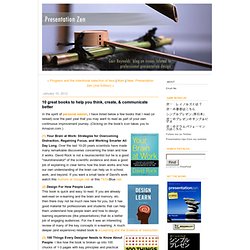
(Clicking on the book's icon takes you to Amazon.com.) The Best Business Books Of 2012: Find Fulfillment, Get Productive, And Create Healthy Habits. Presentation Design & Training - Duarte. About Daniel Pink. Short Bio: Daniel H.
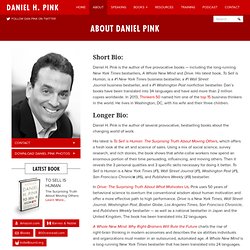
Pink is the author of five provocative books — including the long-running New York Times bestsellers, A Whole New Mind and Drive. His latest book, To Sell is Human, is a #1 New York Times business bestseller, a #1 Wall Street Journal business bestseller, and a #1 Washington Post nonfiction bestseller. Dan’s books have been translated into 34 languages and have sold more than 2 million copies worldwide. In 2013, Thinkers 50 named him one of the top 15 business thinkers in the world.
Longer Bio: Daniel H. His latest is To Sell is Human: The Surprising Truth About Moving Others, which offers a fresh look at the art and science of sales. In Drive: The Surprising Truth About What Motivates Us, Pink uses 50 years of behavioral science to overturn the conventional wisdom about human motivation and offer a more effective path to high performance. In 2013, Thinkers 50 named him one of the top 15 business thinkers in the world.
Prof. Richard E. Mayer - On the role and design of video for learning. Speaking training.
The Art of Storytelling. On Creativity. General. Designing effective powerpoints.